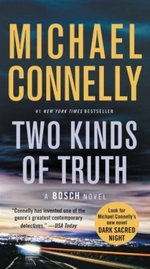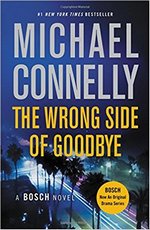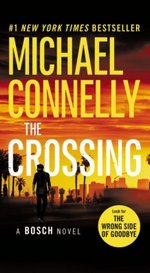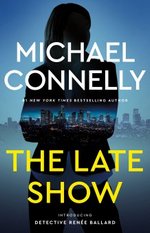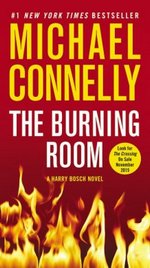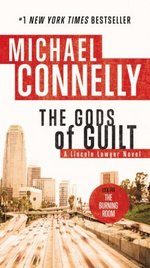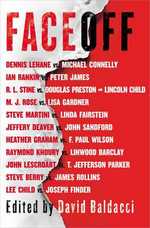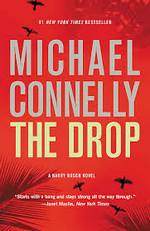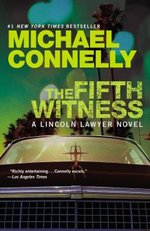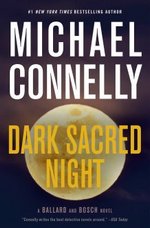 Dark Sacred Night
Dark Sacred Night
by Michael Connelly
Harry Bosch, #20/Renée Ballard, #2Hardcover, 433 pg.
Little, Brown and Company, 2018
Read: October 31 – November 1, 2018

In a series that’s over twenty books long, there’s a lot of character development, recurring faces and names, and the like — there just has to be. But on the whole, there’s not a lot of connective tissue between the books, most of what happens in one book stays in that novel, and the next very likely won’t even mention those events. Which is really kind of odd, when you think of it. But that’s not the case here — this picks up the action from Two Kinds of Truth a few months later and the central case of this novel is one that Harry had reopened in it. This really is a sequel to Two Kinds of Truth in a way that Connelly really hasn’t given us since The Poet/The Narrows.
LAPD politics has moved Lucia Soto off from the case that Harry asked her to pick up — a murder of a fifteen year-old prostitute, Daisy Clayton — so she can devote time to something more pressing, but Harry doesn’t have to play that game. His own work on that cold case brings him back to the Hollywood Station, where he tries to look at some old files (without anyone knowing what he was up to). He’s caught by our new friend, Renée Ballard. Renée being the curious type quickly figures out what he’s looking into and pushes her way into the investigation — unlike Soto, she has time; unlike Harry, she has standing; it’s really the best thing that could happen for the case.
While she’s poking into this cold case and developing some sort of relationship with Harry Bosch — Renée has her own active cases, and regular Late Show duties to perform. I really like the way we get several little cases along the way with her in these two books — sure, there’s the big murder mysteries, but there’s also a robbery, a rape allegation, and other crimes that she has to deal with. This adds variety to the book (as it did in The Late Show), a touch of realism, and gives the readers multiple ways to see her in action.
Harry also has an official investigation to pursue — a cold case in San Fernando is heating up thanks to Harry’s work uncovering a witness. His prime suspect is now a high-ranking member of a pretty serious gang and the consequences for this witness are potentially huge — and things go quickly wrong with this case. So wrong that Harry’s future with SFPD — and his own safety — are in jeopardy.
There are so many balls in the air in this novel that it’s a testament to Connelly’s skill that they never get confused, he devotes time to each as he should, in a way that does justice to each storyline and the book never feels over-populated. If Dark Sacred Night had nothing else going for it, just the construction would be enough to commend it. But there’s so much more to commend the novel, too. There’s a little levity, a lot of darkness, a lot of solid procedural material, a couple of bent rules, and some satisfying story telling — just to name a few of the commendable things. I’m leaving a lot off that list, if only for reasons of space and time.
There’s one criminal here — I’m trying not to spoil anything — who spouts off about his victims not being anyone, of not counting. He’s the philosophical opposite of Harry’s “Everyone counts” mission. It’s an excellent way to highlight just what makes Harry — and maybe Renée — tick and what separates them and some of the gray areas they walk in from those on the other side of the law. We have multiple murderers in this book for whom their victims are just tools, just objects, things go be used. While for Harry, Renée, and those like them — these are people with hopes, dreams, pain and suffering that need to be protected, defended and avenged.
A downside for me was how little non-case work time we got with Renée. Harry had time with Maddie, Cisco and Elizabeth in addition to all the police. Renée got almost no time with Lola, nothing with her grandmother, and only a little time with anyone outside of the Hollywood Station that wasn’t involved in a crime she was investigating. I liked her non-police world just as much as I like Harry’s and wish we’d have gotten time in it.
Like many, I knew that Bosch and Ballard would team-up eventually. But no one expected it so soon. Before reading this, I’d said that I would’ve liked another book or two just to get to know Renée a bit more before bringing Harry in. However, having read this — I’m glad it happened now (still, wouldn’t have minded the other). Having the two of them together emphasizes the non-Bosch-ness of Renée, which is good. Also, it gives her someone she can count on, not overly-influenced by her history, department politics, or any of the nonsense that will follow her for the rest of her career. This also gives Harry a way away from cold cases and San Fernando. Altogether, it’s a smart move on Connelly’s part. Now I guess we just wait on the inevitable involvement of Mickey.
Between the merging of the two worlds, the strong emotional tie Harry has to Daisy and her mother, the upheaval the other case brings to his life, and the continued development of Renée Ballard as a character — there’s just so many positives to this book that it’s hard to enumerate them all. I think this is the best book that Connelly has done — in any of his series — in years. It’s been ages (if ever) that he’s had a clunker of a novel, but this one seems more effective, more entertaining than most. It’s just so well done. This is a must-read for Bosch fans, Renée Ballard fans, Connelly fans or anyone who likes seeing one of the masters of the genre at the top of his game.
—–



